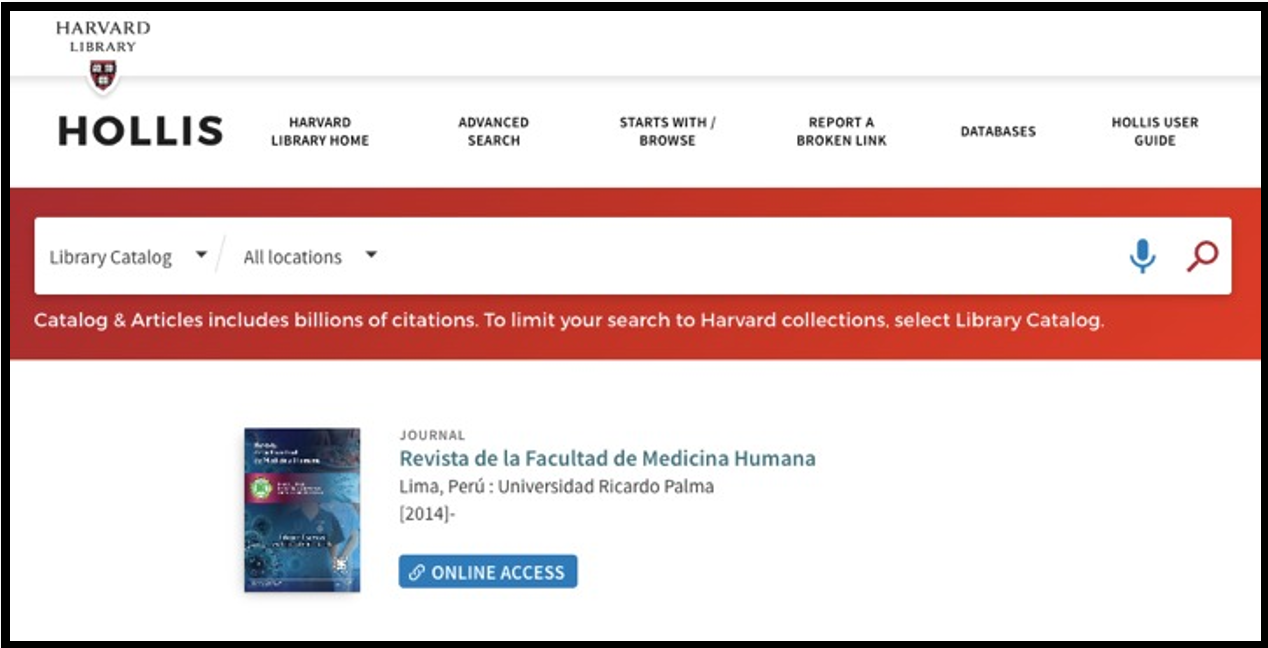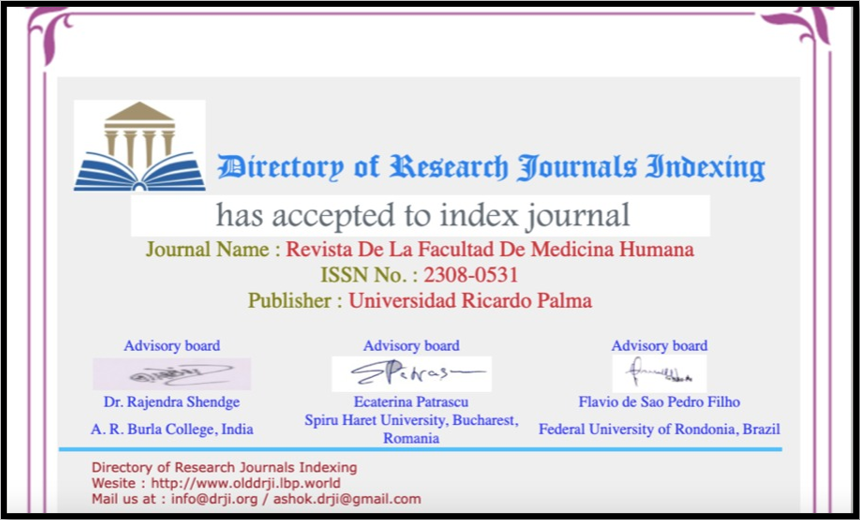EDITORIAL
REVISTA DE LA FACULTAD DE MEDICINA HUMANA 2023 - Universidad Ricardo Palma10.25176/RFMH.v23i2.5741
NEW INDEXING OF REVISTA DE LA FACULTAD DE
MEDICINA HUMANA: HARVARD LIBRARY AND DRJI
NUEVAS INDEXACIONES DE LA REVISTA DE LA FACULTAD DE MEDICINA HUMANA: HARVARD LIBRARY Y DRJI
Jhony A. De La Cruz-Vargas
 1, Gianella Zulema Zeñas-Trujillo
1, Gianella Zulema Zeñas-Trujillo
 1, Dante M. Quiñones-Laveriano
1, Dante M. Quiñones-Laveriano
 1
1
1Instituto de Investigaciones de Ciencias Biomédicas, Universidad Ricardo Palma. Lima, Peru.
The international visibility of the journal is an essential factor for progress and innovation in the medical field. The RFMH fulfills a fundamental function by serving as a means for disseminating research in the medical and public health field. By being indexed internationally, the RFMH not only reinforces its credibility and scientific rigor, but also makes it easier for a broader public to have access to the knowledge generated in the Peruvian and Latin American environment, in addition to the possibility of power, each time in to a greater extent, have research publications of international scope, which enriches the exchange of knowledge and encourages collaboration between researchers from all over the world. It is essential that high-quality research is globally accessible in order to promote significant advances in human health (1).
The visibility at Harvard Library is especially significant. As one of the oldest and largest academic
libraries in the
world, Harvard Library is home to a vast and diverse body of knowledge and the world's most prestigious
journals, such
as The New England Journal of Medicine, The Lancet, The British Medical Journal (BMJ) or JAMA (Journal
of the American
Medical Association).
Being indexed in the Harvard Library places the RFMH among the most prestigious
academic resources
and makes its contributions accessible to a community of students and researchers committed to the
search for truth and
the advancement of knowledge (2). Furthermore, this aligns the journal with
Harvard Library values such as leadership in curiosity, collaboration, access,
and diversity, which can result in a broader and more meaningful impact on society. The tremendous
academic relevance
and becoming a valuable resource for the international scientific community leads to fruitful
collaborations in order to
improve the journal's ability to positively impact healthcare and patient outcomes globally (Figure 1).

visible in the Harvard Library HOLLIS catalog.
Besides, the indexing in the DRJI also represents a highly relevant achievement. DRJI is the most
important database in
India, it was approved by important academic institutions like the Advisory Board of A.R. Burla College,
India; Spiru
Haret University, Bucharest and Federal University of Rondonia, Brazil; and indexes more than 4 thousand
magazines
worldwide. Thus, being an internationally renowned platform, DRJI not only facilitates access to
educational literature,
but also acts as a catalyst in the dissemination of scientific knowledge by providing an integrating
bridge between
academic resources and scholars, researchers, and general public who seek rigorous and high-quality
information. By
being indexed in DRJI, the journal not only increases its visibility on the web, but also opens up to a
diversity of
audiences, including editors, subscribers, researchers and students internationally. In addition, the
DRJI contributes
significantly to the promotion of high-quality indexing standards (3), which
drives the journal to maintain and continuously improve its rigor and editorial quality.
In this
context, the
journal strengthens its capacity to be a predominant voice in the global scientific community, thus
enhancing its reach
and amplifying its contribution to the enrichment of scientific and medical disciplines while promoting
a richer and
more diverse exchange of information. ideas and perspectives in the fields of medicine and public health
(Figure 2).

the Revista de la Facultad de Medicina Humana de la Universidad Ricardo Palma
for its acceptance as an indexed journal.
Additionally, it is satisfying to emphasize that the RFMH has been indexed in the EMBASE database since 2020. EMBASE is a tool of great prestige and highly valued by academics and researchers since it specializes in the biomedical field and is used to access levels highest levels of scientific evidence in systematic reviews and meta-analyses. By being in EMBASE, the RFMH is positioned on a platform that facilitates the search for high-quality scientific literature and allows researchers to access its publications more easily when conducting extensive research and seeking reliable sources of evidence. This also means that studies published in the RFMH can be cited more frequently, increasing their impact on the scientific community. It is crucial to note that by being part of EMBASE, the RFMH is associated with a standard of excellence and rigor in biomedical research, strengthening its reputation and reinforcing its commitment to contribute meaningfully to medical science and public health, both nationally and internationally.
The indexing of the RFMH in the Harvard Library and DRJI represents a significant step toward achieving its mission of advancing medical science and improving public health through the dissemination of high-quality research. By gaining visibility and recognition at an international level, the RFMH has established itself as a leading academic publication. It is imperative that the journal maintains its commitment to excellence and continue to improve its quality and visibility in a constant effort to contribute to the advancement of medical knowledge and the well-being of communities nationally and internationally.
Correspondence: Jhony A. De La Cruz-Vargas.
Address: INICIB, Facultad de Medicina Humana, Edificio I-208. 2do piso. Avenida
Benavides 5440, Surco, Lima-Peru.
Phone: 708-0000/Anexo: 6016
E-mail: jhony.delacruz@urp.edu.pe
Article published by the Journal of the faculty of Human Medicine of the Ricardo Palma University. It is an open access article, distributed under the terms of the Creatvie Commons license: Creative Commons Attribution 4.0 International, CC BY 4.0 (https://creativecommons.org/licenses/by/1.0/), that allows non-commercial use, distribution and reproduction in any medium, provided that the original work is duly cited. For commercial use, please contact revista.medicina@urp.edu.pe.
BIBLIOGRAPHIC REFERENCES
